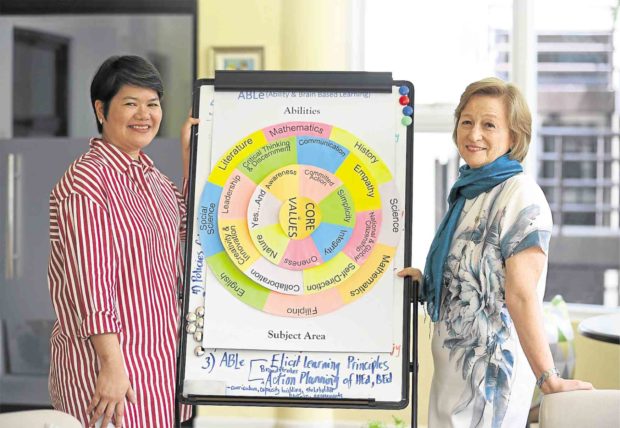Fewer lectures, exams; more ‘Real Life 101’

WELL-ROUNDED Assumption College president Carmen Valdes (right) and assistant vice president for learning innovation Maita Ladrido use a diagram to show how core values can enrich learning and lead to transformative education. —JOAN BONDOC
As recent as last year, Grade 12 student Samantha Ricafort did not know much about Talim Island, a dagger-shaped isle off the coast of Binangonan, Rizal province, and the largest island on Laguna de Bay.
But after spending six days in the barangays on the island as part of her community engagement, solidarity and citizenship course at Assumption College in San Lorenzo Village, Makati, the 17-year-old discovered the “complexities” in the relationship between the island’s residents and those on the mainland.
“They don’t have grocery stores in Talim, or a medical facility — only a clinic where the doctor comes occasionally,” she told the Inquirer. “But though very dependent on the mainland, it seems the islanders didn’t want the mainlanders going to their place. They want to preserve the island [as it is].”
In this digital age of instant information, Ricafort and her classmates could have easily used the internet to do research for their ethnography paper. But under Assumption’s new approach to learning, students get a hands-on experience of the “real world” even before they graduate.
“In previous years, the research we did was mostly focused on textbook information. But in this course, we actually went out and interacted with people,” Ricafort said.
Students in other schools may be preoccupied with written tests and examinations, but Assumption’s young girls are instead focused on project-based learning where skills and abilities learned in the classroom are applied and used to contribute to local communities.
‘Transformative education’
It’s an approach that fosters a “transformative education,” Assumption president Carmen Lourdes Valdes said.
“We want to graduate students who are academically excellent, of course,” she said in a recent interview with the Inquirer. “But they have to use their skills to show loving kindness.”
She added: “If they’re not using [their] skills for that purpose, then we have basically failed [as educators].”
Assumption’s new approach, called ABLe, or Ability- and Brain-based Learning, features five dimensions of learning that are grounded on core values, such as integrity, commitment and oneness.
Valdes said the traditional model—where teachers would give lectures and students were expected to take down notes and memorize names, dates and places—was already passé. “We want [students] to work with the real world from the very beginning,” she said. “This means getting them involved.”
Just last week, Bianca Panganiban, a graduating college student majoring in secondary education, found herself in a classroom teaching English to family drivers and househelp at Barangay San Lorenzo, Makati.
Panganiban, who has been at Assumption since kindergarten, said the challenging experience gave her a boost of confidence that she felt she needed to be a full-time educator.
“The transformative education I learned here is what I want to bring to other students and communities,” she said. “I don’t want my students to feel that when the session is done in the classroom, then that’s it. I want them to realize that the learning never stops.”
Global citizenship
Maita Ladrido, the school’s assistant vice president for learning innovation, said that under the new approach, students were expected to gain empathy, critical thinking, leadership skills, creativity, self-direction, and a sense of national and global citizenship through activities inside and outside the classroom.
All these are guided by values such as awareness, committed action and simplicity, among other things, which are grounded on Filipino culture and context.
This radical change in pedagogy did not come overnight, however. For Assumption, the vision started as far back as 2008.
Recalled Ladrido: “Our big frustration then was that there were no tests that could capture what the students can do.”
The educators saw that standardized testing was meant to test a student’s knowledge in math, science and language. However, it cannot measure the student’s ability to communicate, empathize and get involved in solving problems in the community.
“We know how gifted Filipino women and girls are, but we were not giving them enough of a platform that would allow them space to show their creativity and innovation,” Valdes explained.
This approach remains a work in progress, even if it had been slowly applied for academic year 2017-2018.
New pedagogy
Under the new system, teachers are encouraged to talk less and give fewer tests. Class sizes would be brought down to as few as 27 students in the higher levels, and nine to 15 in classes for younger kids.
Next school year, teachers—who are also being trained by Assumption under the new pedagogy—will be allowed to explore and collaborate with other teachers in projects involving different subjects. The school is also studying the possibility of removing all the desks in the classroom to give students more room to move and interact with each other.
The new changes seem to be working, Ladrido said, noting that students have become hungrier for feedback and asking bigger questions, such as “What can we do for this community?”
Grade 12 student Aria Soliven said as much: “I think the most important thing I learned is that it is not enough to just know; you have to do something with what you know.”
She added: “(Learning) isn’t just about lessons or tests, but knowing how to use your knowledge to contribute to something bigger than yourself.”
The biggest challenge that they face, Ladrido said, is changing mindsets, a process that takes time.
But for a school that has produced two presidents, several lawmakers and other change-makers, Valdes expressed optimism that the new approach would create more empowered Filipinos who would bring the country forward.
“We want our students to leave a positive footprint … to lead wherever they are,” she added.














